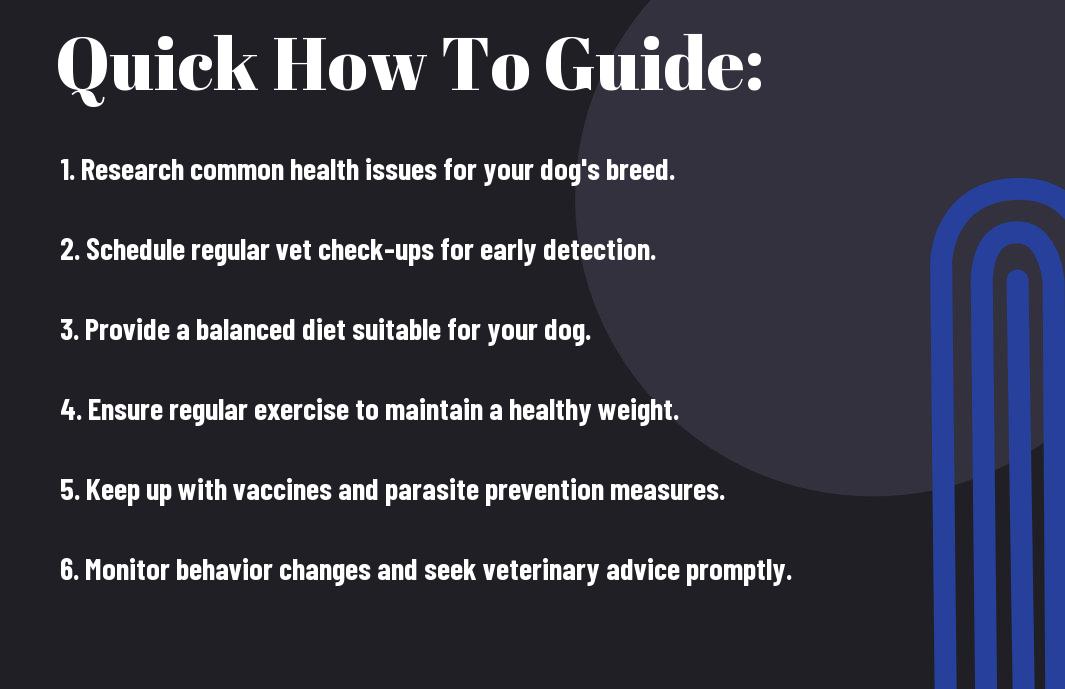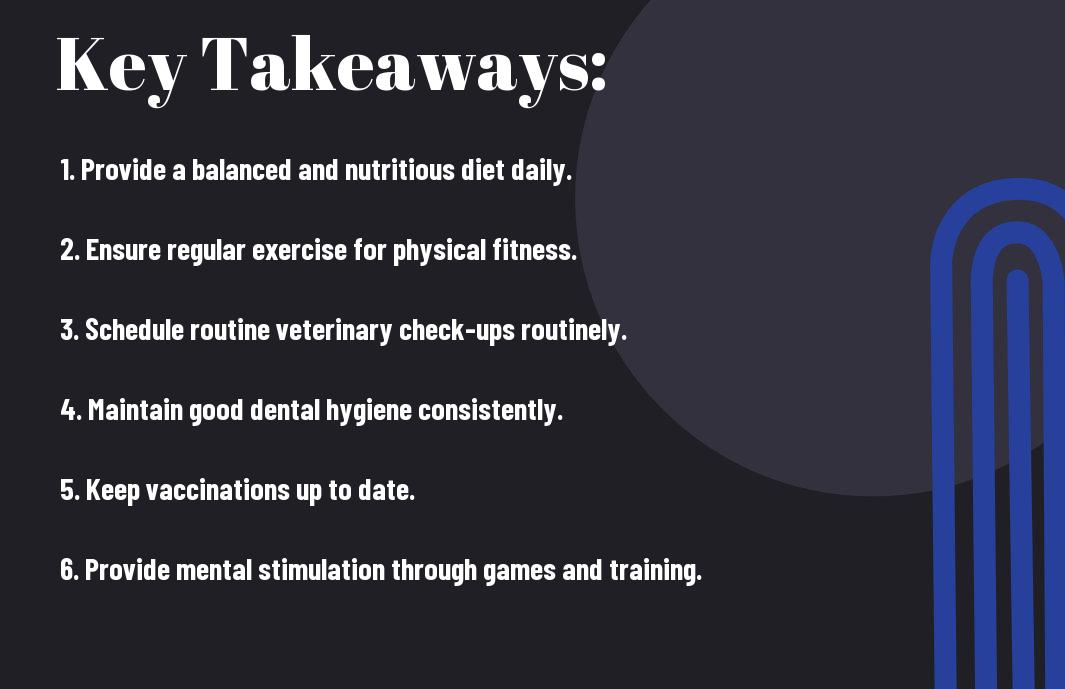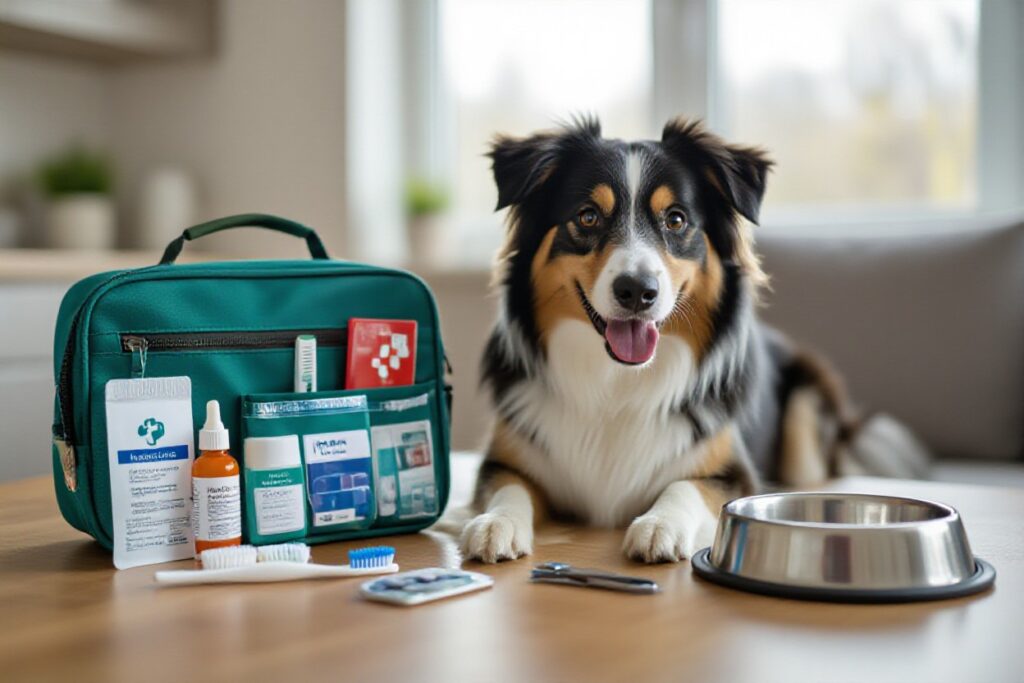There’s a lot that you need to know about keeping your dog healthy and happy. Familiarizing yourself with common health issues can empower you to take proactive steps in preventing them. From obesity and dental disease to heartworms and allergies, understanding these challenges is vital for your furry friend’s well-being. In this post, you’ll learn about the most prevalent health problems dogs face and simple, effective prevention strategies that will help ensure your pet thrives.

Understanding Common Dog Health Issues
As a responsible pet owner, it is vital to have a comprehensive understanding of common dog health issues. Your furry friend, like any other being, is susceptible to various health problems that can affect their overall well-being. These issues can range from mild conditions to serious diseases that may require immediate attention. By being aware of these potential problems, you can take proactive measures to safeguard your dog’s health and enjoy a longer, happier life together.
How to Identify Common Health Problems
Clearly, the first step in ensuring your dog’s health is knowing how to identify common health problems. Regularly observing your dog’s behavior, appetite, and energy levels can provide significant insights into their well-being. Look for signs such as changes in their eating habits, excessive itching or scratching, limping, or lethargy. Subtle changes in your dog’s daily activities can be indicative of health issues that should never be overlooked.
In addition to watching for changes in behavior, maintaining a close eye on your dog’s physical condition is important. Check for any abnormal lumps, swelling, or skin irritations, and monitor their weight to avoid obesity-related problems. Consulting with your veterinarian for regular check-ups can also help you catch potential health concerns early, promoting a healthier and happier life for your pet.
How to Approach Serious Conditions
Common sense dictates that if you notice any severe or persistent symptoms, it is time to take action. Your dog’s health can deteriorate rapidly, and it’s better to err on the side of caution. Consulting your veterinarian promptly for professional advice can help in diagnosing serious conditions effectively. Early intervention is key, as many serious health issues can lead to severe consequences if left untreated.
It is important that you approach your dog’s health with urgency when signs of serious conditions manifest. Symptoms such as difficulty breathing, severe vomiting, or sudden lethargy warrant immediate veterinary attention. Prompt action can mean the difference between life and death for your beloved pet. Always keep emergency contact numbers for your veterinarian handy, as well as the details of local emergency animal clinics. Your proactive approach not only ensures your dog receives the care they need but also reinforces the bond you share, knowing that you are doing everything possible to protect their health and happiness.
Factors Contributing to Dog Health Issues
Keep in mind that various factors can significantly impact your dog’s health. Understanding these factors is key to preventing potential health problems. Here are some main contributors:
- Diet
- Genetics
- Age
- Environment
- Exercise
Perceiving these elements will assist you in maintaining a healthy and happy life for your furry friend.
How Diet Affects Dog Health
To ensure optimal health for your dog, it’s imperative to understand how diet plays a pivotal role. A well-balanced diet tailored to your dog’s age, size, and breed can help prevent many health issues, such as obesity, diabetes, and other chronic conditions. Providing high-quality dog food rich in vital nutrients can bolster your pet’s immune system, enhance their coat health, and promote proper digestion.
Moreover, certain dietary choices can lead to significant problems for your dog. For instance, foods that are high in fillers and artificial additives may not provide the necessary nourishment your pet requires. Pay attention to ingredient lists and choose dog food that prioritizes high-quality protein sources and wholesome ingredients. This proactive measure can greatly influence your dog’s long-term health.
Environmental Factors
Nutrition plays a role, but your dog’s environment is equally important in affecting their health. Factors such as exposure to toxins, inadequate shelter, and lack of socialization can pose serious risks to your pet’s well-being. Ensuring a safe and clean living space is vital in preventing disease and ensuring a healthy lifestyle.
- Pollution
- Climate
- Hazardous chemicals
- Socialization
- Exercise opportunities
Recognizing these environmental aspects can make a significant difference in your dog’s health status.
Plus, be aware that poor environmental conditions can lead to chronic illnesses or increase stress levels in your dog. Proper ventilation, safe outdoor spaces for exercise, and avoiding products containing harmful chemicals are steps you can take to create a healthier environment for your pet. Addressing these aspects can profoundly impact your dog’s overall wellness.
- Safe spaces
- Regular veterinary check-ups
- Social interactions
- Exercise opportunities
- Exposure to allergies
Recognizing the influence of the environment on your dog’s health can lead to proactive measures to set the stage for a vibrant, healthy life for your furry companion.
Tips for Preventing Common Health Issues
Unlike many misconceptions, taking proactive steps to maintain your dog’s health is both simple and rewarding. By incorporating a few best practices into your routine, you can significantly reduce the risk of common health issues in your furry friend. Here are some vital tips to keep in mind:
- Schedule regular vet check-ups for your dog.
- Ensure your dog is vaccinated against preventable diseases.
- Feed your dog a balanced and nutritious diet.
- Provide consistent exercise and mental stimulation.
- Practice good oral hygiene by brushing your dog’s teeth.
- Keep your dog’s living environment clean and safe.
- Be observant and watch for any signs of illness or discomfort.
Recognizing these aspects of pet care can help you maintain your dog’s overall health and well-being.
Routine Veterinary Care
For every dog owner, establishing a schedule for routine veterinary care is a foundational step toward ensuring the longevity and health of your pet. Regular check-ups allow for early detection of any underlying conditions and give your veterinarian the opportunity to administer necessary vaccinations and preventive treatments. Be sure to ask questions and engage in discussions about your dog’s health and any changes you may observe.
Additionally, veterinary visits are important for keeping your dog up to date on vaccinations that protect against various illnesses. Several preventable diseases can cause severe health problems, and by adhering to a vaccination schedule, you contribute significantly to your dog’s health. At these appointments, discussing diet, behavior, and any concerns you may have will provide insights into maintaining their overall well-being.
Maintaining a Healthy Lifestyle
Any dog owner knows that a healthy lifestyle is vital to a dog’s physical and emotional well-being. You should prioritize providing your dog with a balanced diet tailored to their specific breed, age, and health needs. Regular physical activity, such as brisk walks or playtime in the yard, is important for maintaining a healthy weight and preventing obesity-related issues. Engaging your dog mentally through training and interactive play can help reduce behavioral problems and strengthen your bond.
Importance of a healthy lifestyle cannot be overstated. By ensuring your dog receives plenty of exercise, a nutritious diet, and appropriate mental stimulation, you can significantly reduce the risk of serious health conditions, such as heart disease and diabetes. Moreover, keeping your dog active and healthy often leads to an overall improvement in their quality of life, making them happier and reducing veterinary costs in the long run.
How to Properly Care for Your Dog’s Well-being
Once again, as a devoted dog owner, your primary concern is ensuring the well-being of your furry companion. To achieve this, it’s important to understand the multifaceted nature of dog care, which includes providing for their physical, emotional, and health needs. By being proactive in these areas, you can help your dog live a longer, healthier, and happier life.
Grooming and Hygiene
While grooming may seem like a simple task, it plays a significant role in your dog’s overall health. Regular grooming helps to prevent matting and tangles, which can lead to skin irritations and infections. Furthermore, brushing your dog’s coat can help stimulate blood circulation and remove dead hair, while also allowing you the opportunity to check for any unusual lumps, bumps, or skin issues. Bathing your dog appropriately and trimming their nails are equally important, as dirty paws and overgrown nails can lead to discomfort and infections.
In addition to maintaining a clean coat, good oral hygiene is vital for your dog’s well-being. You should consider incorporating regular tooth brushing into your dog care routine, as dental disease is a common problem that can lead to serious health issues, including heart and kidney problems. Providing dental chews or toys designed to promote dental health can also be beneficial, making it easier for you to keep your dog’s mouth healthy.
Understanding Breed-Specific Health Risks
Carefully understanding the health risks associated with specific breeds is important in providing the best care for your dog. Certain breeds are predisposed to particular health issues due to genetics, which is why it’s important to familiarize yourself with not only the common health concerns of your dog’s breed but also the signs to look out for. For example, large breeds like Great Danes may be predisposed to hip dysplasia, while small breeds like Dachshunds are more prone to back issues.
Another aspect to consider is how you can work with your veterinarian to monitor your dog’s health more effectively. Regular check-ups and consultations will allow you to keep track of any emerging health issues related to your dog’s breed. Additionally, by proactively addressing any concerns, you can implement preventive measures such as diet adjustments, exercise routines, and lifestyle changes that can mitigate risks and promote a healthier, happier life for your furry friend.

Effective Home Remedies for Minor Ailments
To ensure your furry friend remains happy and healthy, it’s important to be aware of minor health issues and how to effectively treat them at home. This chapter focuses on some simple home remedies that you can use to manage common ailments that may arise, providing comfort to your dog while also minimizing the need for veterinary visits for minor concerns.
Natural Treatments for Skin Irritations
Irritations on your dog’s skin can be bothersome, but there are natural remedies that can help soothe these discomforts. You can start by using oatmeal baths, which are excellent for relieving itching and inflammation. Ground oatmeal mixed with warm water creates a paste that you can apply directly on the affected areas or allow your dog to soak in it. Additionally, aloe vera gel is another great option, as it has natural healing properties that can calm irritated skin.
Another effective treatment is a mixture of coconut oil and vital oils such as lavender or chamomile. These oils not only have antimicrobial properties but also promote healing while providing a pleasant scent. Always ensure you dilute vital oils properly before applying them to avoid any adverse reactions on your dog’s sensitive skin.
Managing Mild Stomach Issues
The stomach can be a sensitive area for dogs, often leading to mild issues such as gas, diarrhea, or general discomfort. One way to manage these symptoms is by adjusting your dog’s diet temporarily. You can introduce a bland diet consisting of boiled chicken and white rice, which can help calm your dog’s stomach and make digestion easier. Additionally, incorporating pureed pumpkin into their meals can also aid in firming up the stool and alleviating constipation.
Plus, maintaining your dog’s hydration is important when they experience mild stomach issues, as it helps prevent dehydration that can result from diarrhea. Ensuring your dog has access to fresh water at all times will support their recovery. If you notice any persistent symptoms or if your dog’s condition worsens, it’s best to consult a veterinarian to rule out any serious underlying issues.

When to Seek Veterinary Help
For every dog owner, understanding when to seek veterinary help can make a significant difference in your pet’s health and quality of life. Keeping an eye on your furry friend and being attuned to changes in their behavior is vital. Whether it’s a sudden lethargy, unusual eating habits, or persistent vomiting, being proactive about your dog’s health can lead to early diagnoses and effective treatment.
Identifying Emergency Symptoms
With dogs, some health issues can escalate quickly. Look out for signs such as difficulty breathing, seizures, or excessive bleeding, as these situations require immediate attention. Other emergency symptoms can include persistent vomiting, diarrhea, or signs of pain such as whining, excessive panting, or changes in posture. If you notice any of these symptoms, don’t hesitate to contact your veterinarian immediately. Your pet’s life might depend on swift action.
Additionally, specific situations like ingesting toxic substances or experiencing severe trauma, such as being hit by a car, warrants urgent veterinary intervention. Always trust your instincts—if you feel something is off with your dog, it’s better to err on the side of caution.
Understanding Treatment Options
Clearly, understanding the treatment options available for your dog can help ease concerns during a visit to the veterinarian. Treatment may vary significantly depending on your dog’s specific condition. Options can range from dietary changes and medications to more involved interventions like surgery or specialized treatments. Your veterinarian will guide you through each option, detailing the potential outcomes and what to expect during recovery.
Seek to have an open dialogue with your veterinarian to understand the various treatment paths that could benefit your dog. It’s important to consider both the immediate needs and long-term health implications when making treatment decisions. By working closely with your veterinarian, you can ensure that your dog receives the best possible care tailored to their specific health needs.
Final Words
Presently, understanding common dog health issues is vital for ensuring your furry companion lives a long and happy life. By educating yourself on potential concerns and keeping an eye out for early warning signs, you’re taking an imperative step in safeguarding your dog’s well-being. Regular veterinary check-ups, a balanced diet, proper exercise, and preventative care such as vaccinations and parasite control are all effective strategies you can implement to keep your dog healthy. Additionally, being aware of breed-specific health issues and adjusting your care accordingly can further enhance your dog’s quality of life.
By adopting a proactive approach to your dog’s health, you not only reduce the risks of illness but also enhance the bond you share with your pet. Investing time in learning about their needs will pay off in countless joyful moments together. So, stay informed, engage with your veterinarian, and be observant of any changes in your dog’s behavior or habits—they are often the best indicators of their health. Your commitment to preventing health issues today will lead to a happier and healthier future for your beloved canine companion.
Q: What are some common health issues that dogs face?
A: Dogs can experience a variety of health problems, some of the most common include obesity, arthritis, dental disease, skin allergies, and ear infections. Obesity is often a result of overfeeding and lack of exercise, while arthritis can develop due to age or joint injuries. Dental disease is prevalent in many dogs, particularly those who do not receive regular dental care. Skin allergies may be caused by environmental factors or food sensitivities, while ear infections often occur in breeds with floppy ears due to moisture accumulation.
Q: How can I prevent my dog from becoming overweight?
A: Preventing obesity in dogs involves a combination of proper nutrition and regular exercise. Ensure you are feeding your dog the appropriate portion sizes tailored to their breed, age, and activity level. It’s helpful to consult your veterinarian for recommendations on the right diet. Additionally, engaging your dog in daily physical activities such as walks, playtime, or interactive games can significantly help in managing their weight and overall health.
Q: What preventive measures can I take for my dog’s dental health?
A: To maintain your dog’s dental health, regular dental care practices are important. This includes brushing your dog’s teeth at least a few times a week using veterinary-approved toothpaste. You can also provide dental chews or toys that help reduce plaque buildup. Routine veterinary check-ups should include dental assessments, as professional cleanings may be necessary from time to time, especially for breeds prone to dental issues.










